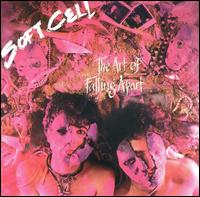The Art of Falling Apart
| The Art of Falling Apart | ||||
|---|---|---|---|---|
 |
||||
| Studio album by Soft Cell | ||||
| Released | January 1983 | |||
| Recorded | 1982 | |||
| Genre | Synthpop | |||
| Length | 40:00 | |||
| Label | Some Bizzare, Sire, Vertigo | |||
| Producer | Mike Thorne & Soft Cell | |||
| Soft Cell chronology | ||||
|
||||
| Singles from The Art of Falling Apart | ||||
|
||||
| Professional ratings | |
|---|---|
| Review scores | |
| Source | Rating |
| Allmusic | |
| Robert Christgau | B- |
The Art of Falling Apart is the second full-length album by the English synthpop duo Soft Cell, released in 1983.
The album reached No. 5 on the UK charts, although its two singles "Where the Heart Is" and the double A-sided single "Numbers" / "Barriers" both failed to reach the Top 20, breaking the duo's run of five consecutive Top 5 singles in the UK, reaching No. 21 and No. 25, respectively.
Initial copies of the album included a bonus 12 inch EP containing the tracks "Martin" and "Hendrix Medley".
The song "Martin" was inspired by the 1978 horror film Martin directed by George A. Romero.
The song "Numbers" refers to the banned 1967 novel Numbers by John Rechy.
In a joint review of The Art of Falling Apart and Berlin's Pleasure Victim, Michael Goldberg of Record remarked that while the opening tracks "Forever the Same" and "Where the Heart Is" are decent, Marc Almond's monotonal vocal style quickly wears thin, and David Ball's use of the same synthesizer stylistics on every track similarly "[makes] the whole album sound like variations on one theme." He particularly derided the synth-pop renditions of Jimi Hendrix songs, saying "Just that concept ought to elicit a chuckle. Suffice to say that Soft Cell are not able to do for the Hendrix songs what they did for Gloria Jones' 'Tainted Love'."
All tracks written and composed by David Ball and Marc Almond, except where noted.
Extra tracks on remastered CD: SOME BIZZARE/MERCURY (558,266-2, June 1998)
...
Wikipedia
